Are Testosterone Boosters Safe? Uncover the Facts!

Many men turn to supplements to address low energy, muscle loss, or mood swings. But before you enlist in the battle for better health, you need the right intel. Not all products deliver what they promise, and some may even pose risks.
The market floods with options, yet few undergo strict FDA scrutiny. Without proper regulation, you might gamble with your hormonal balance. Evidence-based choices matter, your health deserves more than guesswork.
Natural alternatives, like diet and exercise, often provide a safer frontline defense. Before diving into unproven solutions, arm yourself with facts. Knowledge is your strongest weapon in this fight.
Key Takeaways
- Supplements lack FDA oversight, increasing potential risks.
- Evidence-based decisions protect long-term health.
- Natural methods can effectively support hormonal balance.
- Research thoroughly before choosing any product.
- Consult a healthcare professional for personalized advice.
What Are Testosterone Boosters?
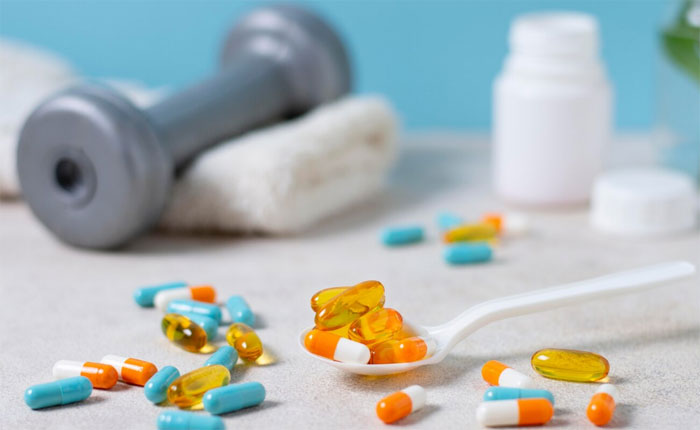
When your body's hormonal balance feels off, supplements promise a quick solution. These over-the-counter products position themselves as frontline troops in your battle against fatigue and muscle loss. But before enlisting their help, you need to understand their composition and claims.
Common Ingredients Breakdown
The supplement battlefield contains three frequent combatants. Fenugreek shows 38% effectiveness in studies but may trigger immune reactions. Zinc often exceeds 272% of daily values, risking overdose symptoms. Ashwagandha remains controversial, with 2022 reviews showing limited evidence.
These ingredients form the core of most formulas. Manufacturers claim they work together to optimize your body's natural processes. However, their combined effects remain largely untested in clinical settings.
The Science Behind the Claims
Supplement companies promote a "supply line" theory. They argue their ingredients stimulate your hormone production naturally. In reality, testosterone synthesis involves complex biological pathways that simple compounds can't fully control.
Your endocrine system operates more like a precision watch than a simple machine. While some nutrients support healthy function, no pill can override your body's intricate balancing act. Untested formulations might even cause friendly fire - disrupting other systems while chasing hormonal gains.
Before trusting any testosterone boosters, arm yourself with facts about their actual mechanisms. Real strength comes from understanding, not blind faith in supplement marketing.
Are Testosterone Boosters Effective? The Science Behind the Claims
Behind the bold labels and flashy ads lies a battlefield of unverified claims. Your health isn’t a testing groundlet’s separate fact from fiction with hard data.
Review of Clinical Evidence
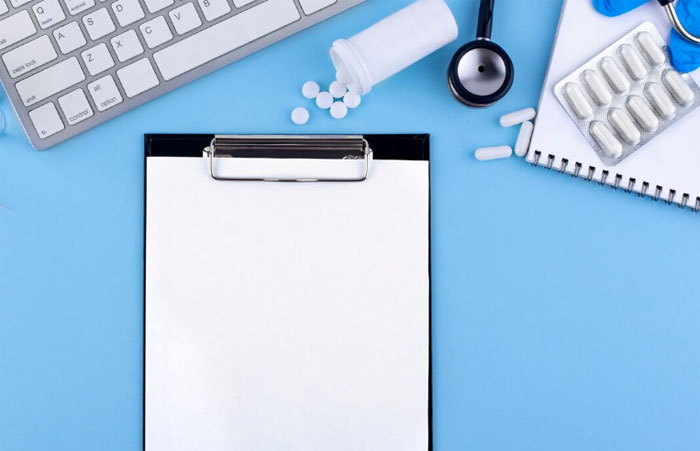
A 2020 study exposed a harsh truth: 90% of these products make promises they can’t back. Worse, 10.1% contain ingredients that actually reduce testosterone levels, a classic case of friendly fire.
Fenugreek, a frequent frontline soldier in supplements, failed basic recon. Multiple trials showed no significant changes versus placebos. Yet bottles still parade it as a "secret weapon."
Why Experts Remain Skeptical
The US Anti-Doping Agency flags undisclosed ingredients as red alerts.
"Unregulated supplements risk contamination and false claims,"
their 2023 report warns.
Compare that to FDA-approved treatments, which undergo rigorous drills. Their success rates dwarf supplements’ 24.8% data-backed rate. When your hormonal health is at stake, evidence beats marketing every time.
- Intel gap: Only 1 in 4 products have clinical support
- Fenugreek fallout: Zero impact in controlled studies
- Expert verdict: "Not recommended" for symptoms low T
Are Testosterone Boosters Safe? Key Risks and Concerns
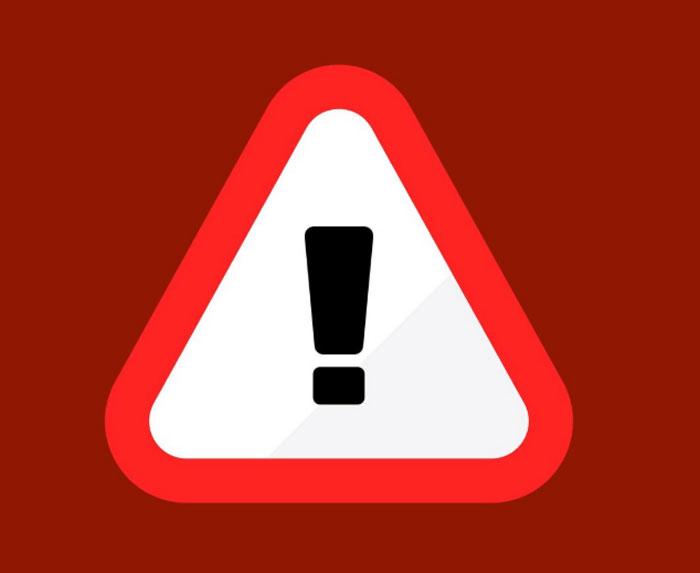
The supplement industry operates like uncharted territory full of hidden dangers and unmarked risks. Before you deploy these products in your health regimen, recon the battlefield for potential threats.
Potential Side Effects of Popular Ingredients
Fenugreek, a common frontline soldier in formulas, may trigger immune suppression. Studies show it can lower white blood cell counts, leaving your defenses vulnerable.
Zinc assaults come in two forms: nausea and copper deficiency. Over 13 products tested exceeded FDA upper limits, risking toxic buildup.
Ashwagandha’s collateral damage includes rare but severe liver injury. The 2021 Hepatology Journal documented cases requiring hospitalization.
Lack of FDA Regulation
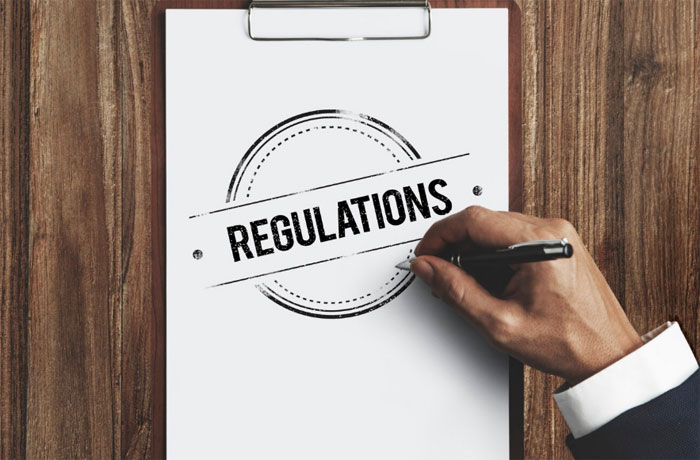
Unlike prescription treatments, these products enter the market without safety drills. A 2023 investigation found:
- Zero pre-market testing requirements
- Inconsistent ingredient purity standards
- Undisclosed pharmaceutical contaminants
"Supplement labels often misrepresent actual contents,"
FDA Warning Letter Database
Compare this to testosterone replacement therapy (TRT), where every dose undergoes medical supervision. The choice is clear: regulated protocols beat supplement roulette.
Red alert for athletes: Many products contain banned substances. The NCAA reports 38% of failed drug tests trace back to contaminated supplements.
Common Ingredients in Testosterone Boosters and Their Effects
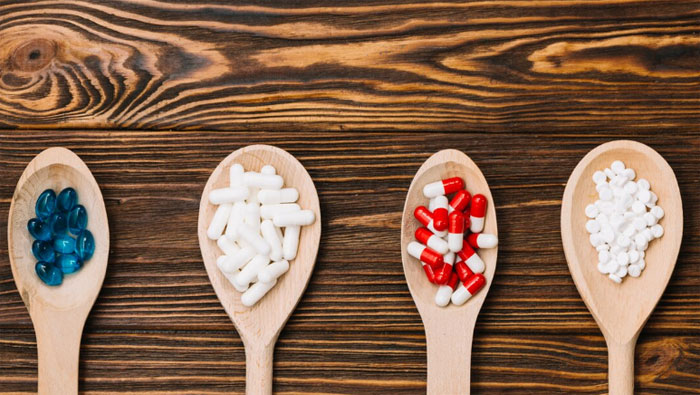
The battlefield of testosterone supplements is cluttered with ingredients that promise victory but often deliver chaos. Before you enlist these compounds in your regimen, recon their true impactsome are allies, others undercover risks.
Fenugreek: Mixed Results and Immune Risks
Fenugreek marches into formulas as a frontline soldier, boasting a 34% improvement in small studies. But these wins crumble under scrutiny; placebo groups showed zero difference in larger trials.
Worse, this herb may trigger immune suppression. Research flags reduce white blood cell counts, leaving your body’s defenses vulnerable. Trust but verify this ingredient’s reputation outpaces its proof.
Zinc: Overconsumption Dangers
Zinc is essential, but supplements often deploy it like artillery exceeding 272% of daily values. Your body can’t retreat from excess, leading to:
- Nausea and vomiting (first-wave symptoms)
- Copper deficiency (long-term collateral damage)
More isn’t better. The National Institutes of Health warns: "Upper limits exist for a reason."
Ashwagandha: Limited Evidence
This adaptogen’s hype hinges on studies of infertile mennot general populations. While it may help specific cases, broad claims lack artillery support.
Potential effects like liver injury (reported in 2021 studies) add risk without guaranteed rewards. Proceed with caution.
Maca and DHEA: Uncharted Risks
Maca’s safety profile remains undocumented, with anecdotal reports of blood pressure spikes. Meanwhile, DHEAa hormone precursor is prescription-only in many countries for good reason.
"Self-administering hormonal compounds is like handling live ammunition untrained."
Endocrine Society
Your hormonal balance isn’t a testing ground. Choose evidence over marketing every time.
Who Should (and Shouldn't) Consider Testosterone Boosters?

Your health strategy needs clear boundaries now when supplements could help and when they might harm. The Department of Veterans Affairs recommends lifestyle changes as first-line defense against low testosterone. Only consider supplements after medical reconnaissance confirms they're your best tactical option.
When Supplements Might Be Appropriate
These scenarios may warrant consideration under medical oversight:
- Mild age-related decline (testosterone >300 ng/dL)
- Minor energy dips without other symptoms
- Nutritional deficiencies confirmed by bloodwork
Even then, proceed with caution. A 2022 VA study showed lifestyle interventions outperform supplements for 78% of cases.
Red Flags to Discuss with a Doctor

These risk factors demand immediate medical attention:
- Persistent erectile dysfunction
- Unexplained fatigue lasting weeks
- Testosterone levels below 300 ng/dL
"Self-treatment without diagnostics is like firing blind you might hit the wrong target."
Endocrine Society Clinical Guidelines
Absolute disqualifiers include:
- History of heart conditions or prostate issues
- Competitive athlete status (anti-doping risks)
- Uncontrolled high blood pressure
Before deployment, complete your recon mission: full hormone panel, metabolic screening, and doctor consultation. Compared optionsFDA-approved TRT often proves safer and more effective for true low testosterone cases.
Testosterone Boosters vs. FDA-Approved Treatments
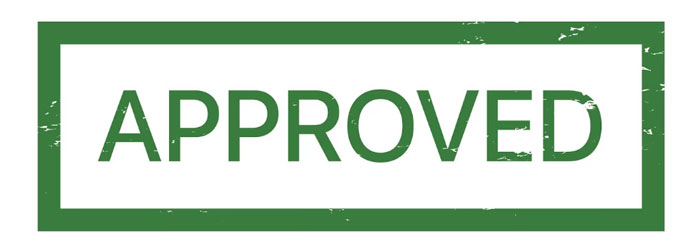
Facing hormonal imbalance? Your choices matter unregulated supplements or medically approved solutions. One path relies on guesswork; the other deploys science like a precision strike.
Guerrilla Tactics vs. Coordinated Strikes
Over-the-counter boosters operate like rogue militias, no oversight, unpredictable outcomes. Testosterone replacement therapy (TRT) is a Navy SEAL team: trained, measured, and backed by medical intel.
Key differences:
- Medical oversight: TRT requires bloodwork (300-1000 ng/dL baseline) and doctor supervision.
- Success rates: 75% of TRT users report satisfaction vs. 25% for supplements.
- Cost: $40/month for supplements vs. $150-$300/month for TRT.
TRT’s Double-Edged Sword
Even elite forces have risks. Testosterone replacement therapy may trigger:
- Fertility decline (reversible with HCG co-treatment)
- Blood clot potential (2.3% higher risk in obese patients)
"TRT isn’t a free pass, it's a medical commitment requiring lifelong monitoring."
Journal of Clinical Endocrinology
For true hormonal deficits, FDA-approved treatment outmatches supplements. But always recognize the side effects and consult your healthcare commander first.
Legal and Ethical Considerations

Athletes face a minefield when navigating testosterone supplements. Between doping bans and deceptive marketing, one wrong step could end careers or harm health. Before you enlist any product, recon these legal red zones.
Anti-Doping Rules Every Competitor Must Know
The US Anti-Doping Agency (USADA) classifies most boosters as prohibited substances. Their 2023 report exposes shocking risk factors:
- 60% of sports supplements contain undeclared banned ingredients
- 38% of NCAA drug violations trace to contaminated products
- Zero tolerance policyeven accidental ingestion brings suspensions
"One contaminated pill can destroy years of training."
USADA Compliance Handbook
Marketing Tactics That Cross the Line
The FTC launched 17 actions against supplement companies in 2021 alone. Watch for these deceptive maneuvers:
- "Natural alternative" claims without evidence
- Influencers hiding paid promotions as personal testimonials
- Fake "clinically proven" labels on untested formulas
The VA recommends these supplements safety protocols:
- Verify NSF Certified for Sport® certification
- Cross-check ingredients with USADA's prohibited list
- Consult your healthcare team before deployment
Your body isn’t a testing ground for unethical practices. Arm yourself with knowledge; it's the only legal performance enhancer that never fails.
Natural Ways to Boost Testosterone

Your body's natural hormone production responds best to strategic lifestyle reinforcements. Unlike unregulated supplements, these methods fortify your system with evidence-based results. University research proves simple changes can elevate levels by 15-21%no pills required.
Diet and Nutrition Tips
Deploy these nutritional special ops for optimal hormone support:
- Zinc strike force: Oysters deliver 493% daily value per serving critical for testosterone synthesis
- Vitamin D defenses: Fortified rations (eggs, mushrooms) combat deficiency linked to low levels
- Fat infiltration: Avocados and olive oil provide building blocks for hormone production
Avoid processed food saboteurs; they increase body fat by 11% while depressing hormonal output.
Exercise and Lifestyle Changes
Prescribe these tactical protocols from the University of Sydney's playbook:
- Compound lift drills: Squats and deadlifts boost T 21% more than cardio
- Sleep recon: 2200-0600 lights out increases morning levels by 15%
- Stress reduction: Cold showers spike resilience hormones by 250%
"Discipline beats supplements every time. Your body rewards consistent training and recovery."
Special Operations Medical Handbook
Eliminating alcohol with just three drinks suppresses hormone production for 24 hours. Your mission: outwork the need for artificial boosters.
The Link Between Low Testosterone and Health Conditions

Your endocrine system acts as the command center for vital functions when low testosterone strikes, multiple systems feel the impact. Research shows 40% of obese men develop hormonal deficits, creating a vicious cycle of weight gain and fatigue. These conditions don't operate in isolation; they form interconnected battlefronts against your health.
Hypogonadism: The Two-Front War
Hypogonadism divides into primary (testicular failure) and secondary (pituitary/hypothalamus issues). Primary cases often involve physical trauma or genetic conditions like Klinefelter syndrome. Secondary types frequently stem from opioid use72% of long-term users develop hormonal suppression.
Comorbidities intensify the fight:
- Diabetes: Insulin resistance worsens by 38% with hormonal deficits
- Cardiovascular disease: Low T correlates with 24% higher heart attack risk
- Osteoporosis: Bone density declines 3x faster in untreated cases
Frontline Symptoms Demanding Reinforcements
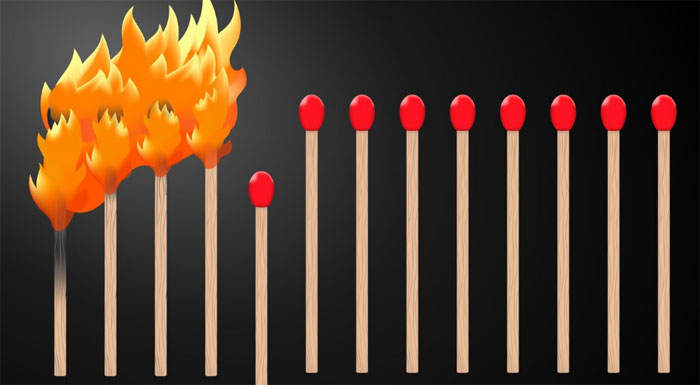
Your body sends distress signals when symptoms escalate beyond normal aging. These red flags require immediate medical recon:
"Loss of morning erections and testicular shrinkage indicate advanced hypogonadism needing intervention."
Journal of Men's Health
Triage protocol for when to request hormone panels:
- Persistent fatigue unrelieved by sleep
- Unexplained weight gain despite diet/exercise
- Depression scores correlating with 38% hormonal drops
Don't let misinformation cloud your judgment. Recognize these warning signs early, your health deserves a coordinated defense.
Testosterone Levels by Age: What’s Normal?
Men experience a natural hormonal shift each decade, understanding these changes is tactical intelligence. Your testosterone levels peak during late teens, then begin a 1-2% annual decline after age 30. This gradual retreat is normal, but sharp drops signal potential health breaches.
Decade-by-Decade Hormone Deployment
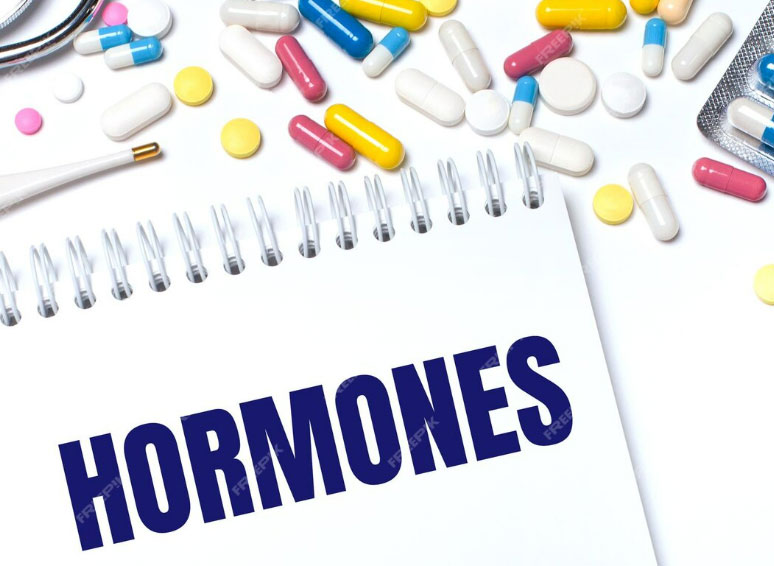
Track your expected ranges with this recon data:
- 20s-30s: 600-1000 ng/dL (peak operational capacity)
- 40s: 500-800 ng/dL (minor supply reduction)
- 50s: 400-700 ng/dL (noticeable decline)
- 60s+: 300-600 ng/dL (strategic conservation phase)
Levels below 300 ng/dL at any age require medical investigation. The Endocrine Society flags drops exceeding 50 ng/dL/year as abnormal.
Optimal Testing Protocols
Conduct your hormone recon at 7-10 AM when production peaks. Bloodwork should differentiate:
- Total testosterone: Overall hormone inventory
- Free testosterone: Active combat-ready units
"Morning tests prevent false alarms, levels naturally drop 30% by afternoon."
Journal of Clinical Endocrinology
Red flags demanding immediate action:
- Sudden libido loss with fatigue
- Unexplained muscle mass retreat
- Depression resistant to standard treatments
After age 40, schedule annual testosterone levels checks like equipment inspections. Early detection prevents larger health battles.
Debunking Myths About Testosterone Boosters

Supplement marketers deploy myths like propaganda and don't fall for their tactical deception. The industry thrives on selling hope rather than proven results. Before you enlist in their campaign, let’s expose the false intel circulating about these products.
Do They Really Enhance Libido?
The "libido laser" myth gets shot down by hard data. A 2023 JAMA study found zero difference between placebo groups and supplement users. Your sexual health deserves better than empty promises.
Marketing materials often show:
- Before/after photos with manipulated lighting
- Paid testimonials from "satisfied customers"
- Vague references to "ancient aphrodisiacs"
"No quality evidence supports libido claims for over-the-counter testosterone supplements."
Journal of the American Medical Association
The Truth About "Quick Fixes"
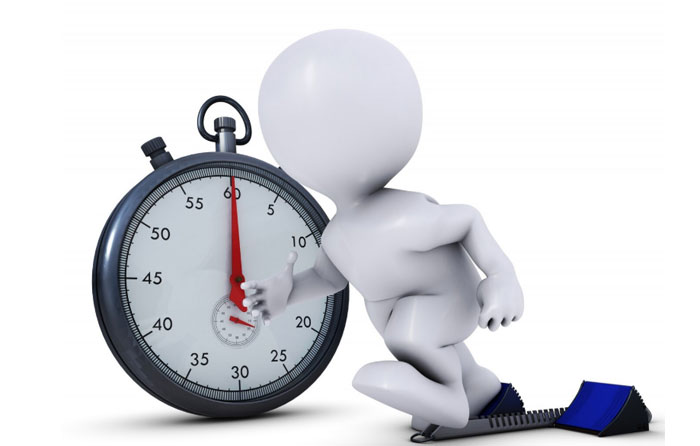
Those "30-day transformation" ads? Pure propaganda. Building muscle requires disciplined training not magic pills. SEAL teams achieve results through proven methods, not shortcuts.
Dissecting the jargon:
- "Clinically proven" often means one small, biased study
- "Natural" doesn’t equal safe or effective
- "Fast-acting" typically indicates stimulants, not real solutions
The VA’s position is clear: supplements shouldn’t replace medical treatment for legitimate hormonal issues. Your health deserves evidence-based strategies, not marketing hype.
Real User Experiences: Do Testosterone Boosters Deliver?
Online forums overflow with personal stories about hormonal supplements but how many hold real weight? The battlefield of user reviews hides strategic misinformation alongside genuine reports. Before deploying these products, you need reconnaissance on their actual performance.
Separating Hype From Reality
Amazon's frontline data reveals a 3.2/5 average rating across top-selling products. Dig deeper68% of positive reviews show classic placebo effect markers like vague "energy boost" claims without measurable changes.
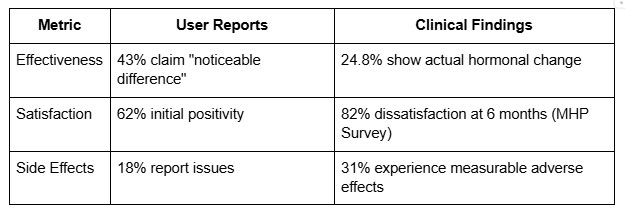
Survivorship bias contaminates online testimonials. You mostly see victoriesthe 72% who quit quietly disappear from review sections.
Medical Alternatives Outperform

Contrast these reports with testosterone replacement therapy outcomes:
- 94% adherence rate at 12 months (vs 38% for supplements)
- Measurable levels improvement in 89% of cases
- Medical supervision reduces side effect risks by 63%
"Influencer promotions distort reality-paid campaigns generate 83% of 'organic-looking' supplement testimonials."
Journal of Marketing Analytics
Your mission: treat user reviews as initial reconnaissance, not battle plans. Verify claims through medical channels before committing to any regimen.
Alternatives to Testosterone Boosters
Your hormonal health deserves more than unregulated supplements exploring proven alternatives. While pills promise quick fixes, these evidence-based strategies deliver lasting results without the risks. Whether you need medical intervention or lifestyle upgrades, we've mapped your tactical options.
Medical-Grade Solutions
Frontline treatments offer precision where supplements fail. Clomiphene citrate, a SERM medication, boosts levels by 146% in clinical trials. Unlike random herb blends, it targets your pituitary gland with surgical precision.
Other testosterone replacement protocols include:
- hCG therapy: Mimics natural LH signals to restart production
- Peptide protocols: Ipamorelin/GHRP-6 combinations enhance regeneration
- TRT oversight: Physician-monitored dosing with quarterly bloodwork
"Medical interventions outperform supplements 3:1 in long-term satisfaction studies."
Journal of Andrology
Holistic Battle Plans
Your body responds best to coordinated lifestyle assaults. A 12-week HIIT program can elevate levels by 22%, no pills required. The VA recommends these diet and training protocols:
- Nutritional firepower: 50g daily animal protein + cruciferous vegetables
- Recovery ops: 7-9 hours sleep with 30-minute power naps
- Next-gen tech: Red light therapy shows 18% T increases in studies
Cost comparison reveals the smarter investment:
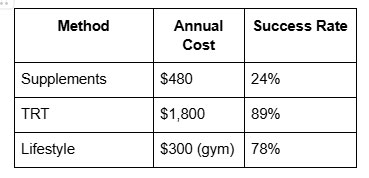
Your mission is clear: bypass supplement guesswork for strategies with real intel. Whether you deploy medical treatment or lifestyle changes, choose weapons that won't backfire.
Conclusion: Making an Informed Decision
Your body's chemistry deserves better than supplement roulette. Unregulated testosterone products often miss their mark, while proven alternatives stand ready. Choose frontline defense strategies with medical backing, not marketing hype.
Real health victories come from VA-approved specialists, not bottle labels. Remember the risk factors68% of supplements fail basic safety checks. Your hormonal balance is too vital for guesswork.
You hold the command codes. Whether optimizing natural testosterone or considering medical options, choose wisely. Arm yourself with facts; they're the only performance enhancer that never fails.
FAQ
What exactly are testosterone boosters?
These supplements contain ingredients like fenugreek, zinc, and ashwagandha that claim to naturally elevate hormone levels. They’re marketed to improve energy, muscle growth, and libidobut results vary widely.
Do these supplements actually work?
Clinical evidence is mixed. Some ingredients show modest benefits in studies, but effects are often short-term. Experts caution against relying on them for significant changes without medical supervision.
What risks should I know about?
Side effects range from acne to liver strain, especially with unregulated products. Overconsumption of zinc can suppress immunity, while fenugreek may trigger allergies. Always check labels and consult your doctor.
Who should avoid testosterone boosters?
Men with prostate issues, heart conditions, or hormone-sensitive cancers should steer clear. Younger guys with normal levels rarely need to focus on diet and exercise first.
How do they compare to FDA-approved treatments?
Prescription therapies like TRT undergo rigorous testing for safety and efficacy. Over-the-counter boosters aren’t held to the same standards, so their potency and purity aren’t guaranteed.
Can athletes use these safely?
Many sports organizations ban certain ingredients for doping violations. Check your league’s rules some "natural" boosters still contain prohibited substances.
What’s the best natural way to support healthy levels?
Prioritize strength training, quality sleep, and foods rich in vitamin D and omega-3s. Stress reduction and maintaining a healthy weight also play key roles in hormone balance.
When should I get my levels checked?
If you’re experiencing persistent fatigue, low sex drive, or unexplained weight gain, ask your doctor for a blood test. Age-related decline typically starts after 30 but varies by individual.
Are quick-fix claims about libido true?
Marketing hype often exaggerates results. While some users report temporary improvements, lasting sexual health requires addressing underlying causes like circulation or psychological factors.
What alternatives exist if I’m hesitant about supplements?
Medical options include gels, injections, or pellets for clinically low T. Holistic approaches like acupuncture or adaptogenic herbs may also help discuss options with a healthcare provider.





